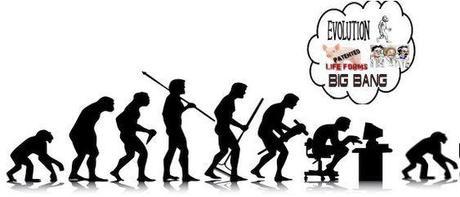
The idea that human beings “evolve” is really an ambiguous, if not meaningless, proposition.
A person who decides to be a thief, and studies, practices for that purpose, can indeed evolve and become a better criminal.
In and of itself “evolution” is empty, unless a goal of some sort, or ideal, is the end aim of the evolution. Said another way, as the Taoists believe, the Way or the Tao is exactly that, the way things go, and it applies to everything in the universe. ALL of it is in constant state of change, not merely Man or the Earth. In the same way that a runner builds stamina, and practice makes perfect, we can see how we humans alone can evolve, and so better our predicament, in the span of just a decade or two. This kind of evolution, like the inevitable advancement of the world, is a fact, by virtue of historical proof.
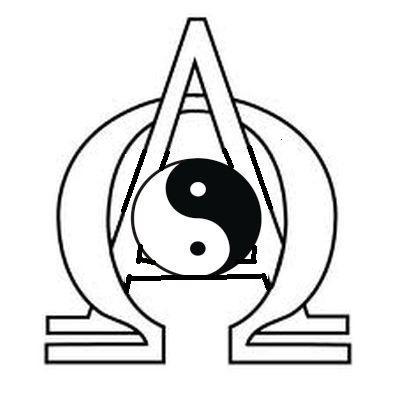
The Tao or The Way, perhaps as the Greeks would have said, the Logos, or as the Buddhists would say, the way the Lotus comes to flower, are all affirmations of an evolution, in the sense of their being indicative of a coming-to-be, representing a world being created (with, or) within time. Ethically this is a neutral proposition: it is not good or bad that we “progress” in this way. It just is, well THE WAY it works.
Now recognition of all these facts is nevertheless no reason to justify Darwinism or Macroevolution, which are specialized versions of traditional ideas about evolution, versions which attempt to expand on known truths to create new ones. As we have said, what is good in Darwinism and Macroevolution is good because it is ancient lore, it is old news and even common sense thinking; you water your plants with the expectation it will evolve to a better plant, or at least grow as it should (by nature). Parroting of this knowledge as old as man does not allow the claim that the “Origin Of Species” is now known.
Indeed, Darwin’s one (kind of) original thesis, that the origin of a species is a different species, or even genera, has yet to be proven at all. No evidence exists showing any “halfway” creature, but for the record, let’s consider the platypus. The platypus looks like an otter mated with a duck and a beaver, or like a beaver that got its face stuck in a duck’s bill. It lays eggs like a duck but is classified as a mammal, one of few venomous mammals, with poison spurs on its back feet. Can this be evidence of a Darwinian Evolution in action, maybe a duck becoming a mammal, or vice versa? We have still ducks and beavers and otters, how do we know which way this platypus is going? Which way of the evolution is the advancement?
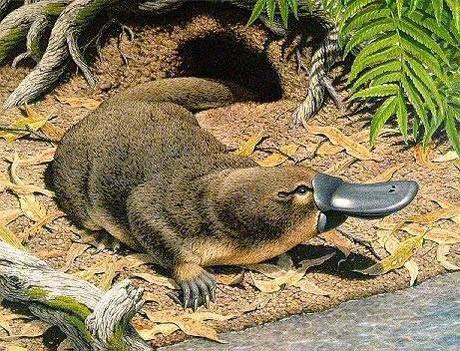
As a point of fact, the platypus is known to have existed over 100,000 years ago, in its present form, with slight modifications due to The Way. No one disputes that each individual species changes, what is highly disputable is whether these natural changes and progressions alone are enough for new species to come out of old ones.
But worst of all for Darwinism, EVEN if it is correct, and EVEN if what it says were to be true, the theory itself begs the question. If every creature came from another creature, there is still the question of that primordial creature from which evolved all the others. EVEN according to “Darwinia” you have that problem of not merely the first creature, but more the reason for the creature at all. You must ask, why something rather than nothing, why creaturedom at all? Why would the “primordial slime” proceed forth this way here, and another way there?
All this investigation toward finding the Origin of Man has made one assumption which so far has gone undefended. I believe an elucidation of this is conducive toward understanding the truths we have so far come upon.
Specifically, what exactly “Man” is, as I have been using it, has not properly been defined. The concept “Man” as I usually use it, capitalized and without quotes, is one which stands for all human beings. Technically, and were it not for the simplistic minds and ulterior motives of people in science at the time, only ONE species of “homo” has ever existed, and should be classified as such, and that is Man. What has been called “homo,” and so of the same genus as human beings, such as homo ergaster, homo habilis, homo rudolfensis, and similar monkeys, apes, and chimps, of yore, are not properly “homo” at all. This continued mistake in classification not only demeans the status of humanity, making it more like the animals, but also expects too much of the animal.
The common (Linnean) classification of human beings, or Man, runs like this:
Kingdom: Animalia (Animal)
Phylum: Chordata (Backboned, with a spine)
Class: Mammalia (Mammal)
Order: Primates (Ape-like)
Family: Hominid (Humanoid)
Genus: Homo (Man)
Species: Sapiens (Thinking, or Wise)
If indeed humans and mice have four-fifths of their genes in common then clearly DNA is no reason alone to classify humans with the apes or the dug-up apes. Today, DNA is read backwards. It is assumed that the DNA is programmed into the composite of the creature. Understand what is happening here. The form takes precedence over the matter. The very same carbon, which will be gathered to help form the mouse on one hand, the ape on the other, will be so gathered by virtue of a pre-existing plan contained within the form, or IDEA for the creature. The matter it is composed of is really incidental, as the carbon, water, and trace elements of which everything is composed, is also shared alike by everything found on this Earth. With everything living, compared, you will find DNA similarities, as well as differences. The similarities come from the common elemental structures used to construct all life, and the differences from the specific form of each creature. Patterns arise in living creatures not because they are necessarily the same in any way, but more often because this is the best way for life to be formed. Why change what works?
The main question we should concentrate on answering is whether, starting from the top of this classificatory scheme (and I have omitted the sub-classes), is whether Man is part of the Animal Kingdom at all.
On the surface, yes, man is like the animals. We eat like the omnivores, procreate like the rest of the mammals, have a backbone, nurse with milk, stand on our hind legs, have no feathers, etc. Remember, though, that in Aristotle’s classification system, everything “higher” on the ontological chain also contains within its form those aspects of the lower. Hence, a cow grows as does the grass it eats, reproduces very similarly to the flowers it lays next to in the field, and takes in nourishment and excretes wastes, just like the weeds and trees. But no scientist would ever think about classifying a cow with a weed. All this to say that just because Man has things in common with the animals, does not necessarily mean he should be classified with them. Well then, is Man in some way different than animals, at least as different from animals as animals are from plants (and both, from protista)? Can we really argue that Man ought to be a Kingdom in itself?
Yes we can. Here are just some of the things which distinguish Man from every other Earth creature:
1. Language, and all its implications/derivatives/conceptual constructs
2. Advancement as a species, in general trying to better themselves and situations
3. Personal adornment, primping, preening, beautifying
4. Writing, written communication, with all the implications
5. Capable of high level of thought and imagination (fantasy)
6. Creation, novelty, invention
7. Establishment and maintaining of personal relationships beyond utility
One could, reasonably and with empirical justification, prove that Man is a Genera of his own.
All this rehash is a bit necessary because while Darwinism and Macroevolution ultimately fail, it would be foolish to discard the idea of Evolution. Let’s then consider what a person could mean by “evolution”:
1. A change, in general (random movement)
2. A change, for the better (purposeful movement)
Is the Way, or the Logos, that is real Evolution, itself guided by a spirit of advancement, or is it merely a random movement, or general expansion? Where and when does the ethics meet the ontology? Many great teachers, from BC times on, have said that all living things have a potential, and that the conditions in which they arise determine whether or not that potential is reached. In regards to us humans, what can evolving mean? Does it mean to become more rich, or more strong, or more intelligent, more…prolific? If you or I wish to better ourselves, let’s be more specific – what would we use as our guide? How would we know what constitutes advancement at all, let alone how to go about achieving it? Put another way, if you could have or be anything, and have the means and ability to do so, how would you know what to choose? In what direction should you go?
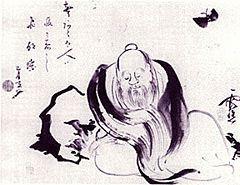
That is why I wish to discuss a bit the concept of the self-actualized individual, or the authentic person. This phenomenon goes by several names. The Taoists use the term Zhenren; the Hindus the Bodhisattva, perhaps Sat Guru; the Muslims usually reserve Al-Insān al-Kāmil for Muhammad and his Imam successors; Aristotle and later Maslow called it the Self-Actualized or Self-Realized man. The concepts “guru,” “master,” “wise man,” “arhat,” even, I argue “Super Man,” all mean to signify one enlightened and just a bit more in-tune with the world than anyone else. Many of the great Christian martyrs and philosophers would qualify. To give you an example here are some characteristics of this ideal:
From Wikipedia:
Zhenren (Chinese: 真人; pinyin: zhēnrén; Wade–Giles: chen-jen; literally ‘true or genuine person’) is a Chinese term that first appeared in the Zhuangzi meaning “Daoist spiritual master”, roughly translatable as “Perfected Person”. Religious Daoism mythologized zhenren to rank above xian “transcendent; immortal” in the celestial hierarchy, while Chinese Buddhism used it to translate arhat “enlightened one”.
From the Zhuangzi:
There must first be a True Man before there can be true knowledge. What do I mean by a True Man? The True Man of ancient times did not rebel against want, did not grow proud in plenty, and did not plan his affairs. A man like this could commit an error and not regret it, could meet with success and not make a show. A man like this could climb the high places and not be frightened, could enter the water and not get wet, could enter the fire and not get burned. His knowledge was able to climb all the way up to the Way like this.
The True Man of ancient times slept without dreaming and woke without care; he ate without savoring and his breath came from deep inside. The True Man breathes with his heels; the mass of men breathe with their throats. Crushed and bound down, they gasp out their words as though they were retching. Deep in their passions and desires, they are shallow in the workings of Heaven.
The True Man of ancient times knew nothing of loving life, knew nothing of hating death. He emerged without delight; he went back in without a fuss. He came briskly, he went briskly, and that was all. He didn’t forget where he began; he didn’t try to find out where he would end. He received something and took pleasure in it; he forgot about it and handed it back again. This is what I call not using the mind to repel the Way, not using man to help out Heaven. This is what I call the True Man.
…This was the True Man of old: his bearing was lofty and did not crumble; he appeared to lack but accepted nothing; he was dignified in his correctness but not insistent; he was vast in his emptiness but not ostentatious. Mild and cheerful, he seemed to be happy; reluctant, he could not help doing certain things; annoyed, he let it show in his face; relaxed, he rested in his virtue. Tolerant, he seemed to be part of the world; towering alone, he could be checked by nothing; withdrawn, he seemed to prefer to cut himself off; bemused, he forgot what he was going to say. …
Therefore his liking was one and his not liking was one. His being one was one and his not being one was one. In being one, he was acting as a companion of Heaven. In not being one, he was acting as a companion of man. When man and Heaven do not defeat each other, then we may be said to have the True Man.
This idea of stoicism in the face of adversities and windfalls alike is characteristic of a self-actualized, authentic, indeed super human being. Whether the ideal is worth striving for or not, the Stoic approach to life, essentially “rolling with the punches” signifies an attitude more accepting of The Way than trying to battle or overcome it.
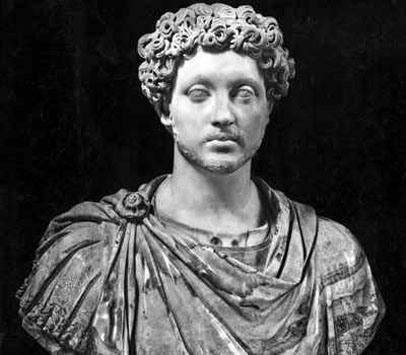
Marcus Aurelius, the Roman philosopher-king, was such a man. From Meditations:
About what am I now employing my own soul? On every occasion I must ask myself this question, and inquire, what have I now in this part of me which they call the ruling principle? And whose soul have I now? That of a child, or of a young man, or of a feeble woman, or of a tyrant, or of a domestic animal, or of a wild beast?
What kind of things those are which appear good to the many, we may learn even from this. For if any man should conceive certain things as being really good, such as prudence, temperance, justice, fortitude, he would not after having first conceived these endure to listen to anything which should not be in harmony with what is really good. But if a man has first conceived as good the things which appear to the many to be good, he will listen and readily receive as very applicable that which was said by the comic writer. Thus even the many perceive the difference. For were it not so, this saying would not offend and would not be rejected in the first case, while we receive it when it is said of wealth, and of the means which further luxury and fame, as said fitly and wittily. Go on then and ask if we should value and think those things to be good, to which after their first conception in the mind the words of the comic writer might be aptly applied- that he who has them, through pure abundance has not a place to ease himself in.
I am composed of the formal and the material; and neither of them will perish into non-existence, as neither of them came into existence out of non-existence. Every part of me then will be reduced by change into About what am I now employing my own soul? On every occasion I must ask myself this question, and inquire, what have I now in this part of me which they call the ruling principle? And whose soul have I now? That of a child, or of a young man, or of a feeble woman, or of a tyrant, or of a domestic animal, or of a wild beast?”
If human beings are evolving, it appears to me that they should be evolving to become authentic individuals. Rather than evolve to a size, or a height, or a sturdiness, things which come naturally because of the way Nature works, human evolution, a more human evolution, would be directed toward a more ethical way of living.
It is not in harder substance, or greater longevity that Man will find his future. Evolution of Man in particular, as opposed to advancement of the world in general, can only come from advancement in intellectual, ethical, and moral understanding. Logic is only the beginning of Man’s true Evolution. Once it is understood what honesty, and so honest thinking should be in structure, Man becomes intellectually prepared to advance apart from, and somewhat independent of the normal restrictions imposed by Nature. The “Sat Gurus,” the Enlightened Ones, The Zhenren - not merely the famous ones known to all history and all religions, but the multitude of others with names nobody can remember, but nevertheless by whose deeds and words the world yet remains on an even keel - these are the limits of Man, and in a sense, the maintainers of everyone else.
Zhenren are at once guides and guideposts, pointers of direction as well as lights in the darkness. Ostensibly, one might be shaven bald, the other with hair to his knees, one dressed in clean solid colors, the other in muddied plaids, one chanting mantras, the other humming homilies or the Beatles, but in spirit they will be the same. The Enlightened Ones do not set dress code standards, or tell you the right way to hold a fork or dress for a funeral, in fact most Zhenren have some bad habits, as some would call them, whether smoking or drinking, or womanizing, or antisocial or otherwise bad attitudes, and most of them hold a healthy disdain for the opinions of the majority. Character flaws, indeed, seem a trademark of the more famous of the Enlightened Ones. Yet by their actions we known them to be peaceful, respectful, helpful, kind, and really unable to purposefully harm other human beings. More importantly, we know they sometimes become aware of information and knowledge beyond the scope of their experience. They know, even when they shouldn’t, so much so that some have said maybe it would be better to know nothing at all. Nietzsche set the path by observing that according to standard evolutionary laws Man should be evolving toward becoming something else, something no longer Man, something beyond Man, in fact, a Superman. That this idea has become visualized by a flying super-strong man in a leotard, rather than, say, an unflappable, original visionary, recluse, or mystic living in a barrel, makes what one means by “super,” or even “better,” a very important question.
